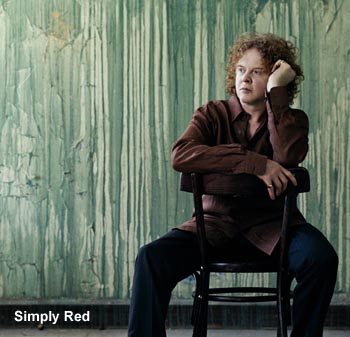Simply Red interview
Simply Red
Orchestral Movements On A Lark: A Q&A With Mick Hucknall
There are a few things that distinguish Simply Red frontman Mick Hucknall. For one, there’s his curly shock of red hair, from which the band derive their name. His soulful wail, which one might not expect to come from someone who looks like him, is another. And, 20 some years after their breakthrough hit, “Holding Back The Years,” Simply Red are still at it, with Stay (simplyred.com) being their latest release. Hucknall spoke with us about the band, the new disc, and the changes in his life.
IE: After more than 20 years, are you ever amazed at the longevity of Simply Red?
Mick Hucknall: I knew I was going to do this for my career, but I didn’t realize that I would be enjoying the level of the success that we have. I thought maybe I might end up on a cruise ship or something [laughs]. We seem to be keeping our popularity, especially in Europe, and it’s bit of a dream actually.

IE: How would you say that you’ve changed over the years?
MH: Well, I hope that I’ve matured and become more reasonable and more sane.
IE: Some of the songs on Simply Red’s latest album, Stay, seem to alternate between being in love (“The World And You Tonight,” “Stay”) and being out of love (“So Not Over You,” “They Don’t Know”). Is that a reflection of something that was occurring in your own life?
MH: I think so, yeah. But also there are parts of the album that are observing contemporary culture and how we live in this kind of consumer world that we’ve created. I am trying to write, from my perception, as something that I see as some form of realism.
IE: The songs “Money TV,” “The Death Of The Cool,” and “Little Englander” definitely qualify in the latter. You get to express your political side in those songs. Is it important to you to be able to include that aspect of yourself on an album?
MH: I don’t really like to use the word “political” because when I use political I think of the people in Washington. Politics for most people are their wage package, how they get their kids educated, and how they control their health. That’s the side that I’m more interested in — social movement and how things are going on. I think the word political is not really appropriate.
IE: So you’re more of a musical activist.
MH: Well, yeah, if you’d like [laughs]. I don’t mind that.
IE: “Good Times Have Done Me Wrong” has an especially autobiographical ring to it.
MH: I agree with you that it feels that way. It’s a time for me now to sort of take stock in my life a little bit because I am about to go through a major change by having my first child. We’re going to have a daughter some time in June. I think that partly was the cause of me just reviewing all the good times that I’ve had. To a certain extent, living a hedonistic lifestyle as a bachelor can do you wrong. It can be a lot of fun, but it doesn’t really get you very far. It just kind of gets you a little bit chubby and puffed up with the alcohol and the late nights, but you don’t really get much in return at the end of it.
IE: You don’t have much to show for it.
MH: No, you don’t. And I’ve done all that and had all that time and I’m remembering it, I’m not even really saying it was a mistake, but it certainly didn’t do me much good.
IE: The disc also includes a cover of Ronnie Lane’s Faces tune “Debris” — why was it chosen?
MH: I’ve always loved this song. I used to play it on my record player when I was about 11, 12-years old. It’s a song that’s always stayed with me and I was really sad about the premature death of Ronnie Lane. I really loved the song and I just wanted to record the song. I had the right band lineup to do it at the this time and it’s really, without doubt, a tribute to Ronnie Lane, and a tribute to the great era of ’70s music coming out of Britain at the time.
IE: Simply Red has performed covers in the past, and had a hit with “If You Don’t Know Me By Now.” As a songwriter, what qualities do you look for in a song you select to cover?
MH: That’s a good question. What I like is just a different interpretation of life. As a writer, you tend to kind of have a polarized view of the world and it’s always good to look at other people’s songs to get another take on life. That’s why I’ve always chosen to do other people’s songs. I’ve tried to choose songs I thought somehow I could, if not make my own, then certainly give them a specific identity different to the original.
IE: Speaking of covers, Simply Red “covered” itself by revisiting some early material on the Simplified disc, a trend that was also done by Joni Mitchell and Cyndi Lauper, to mention a couple. Was it a good experience for you to reclaim those songs?
MH: I just was attracted, at the time, to orchestra and the string sounds. It was just an interesting experience to do some versions featuring an orchestra.
— Gregg Shapiro











